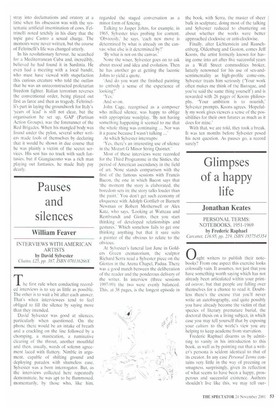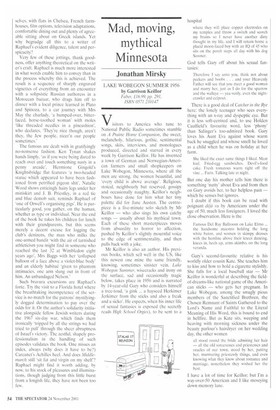Glimpses of a happy life
Jonathan Keates
PERSONAL TERMS: NOTEBOOKS, 1951-1969 by Frederic Raphael Carcanet, £16.95. pp. 219, ISBN 1857545354 Ought writers to publish their notebooks? From one aspect this exercise looks colossally vain. It assumes, not just that you have something worth saying which has not already been articulated within your printed oeuvre, but that people are falling over themselves for a chance to read it. Doubtless there's the excuse that you'll never write an autobiography, and quite possibly you have already become the victim of that species of literary premature burial, the doctoral thesis on a living subject, in which case you may tell yourself that by exposing your cahiers to the world's view you are helping to keep academe from starvation.
Frederic Raphael disarms us by admitting to vanity in his introduction to this book, as well as by pointing out that a writer's persona is seldom identical to that of its creator. In any case Peryonal Terms contains very little in the way of preening or smugness, surprisingly, given its reflection of what seems to have been a happy, prosperous and successful existence. Authors shouldn't live like this, we may tell our
selves, with flats in Chelsea, French farmhouses, film options, television adaptations, comfortable dining out and plenty of agreeable sitting about on Greek islands. Yet why begrudge all this to a writer of Raphael's evident diligence, talent and perspicacity?
Very few of these jottings, thank goodness, offer anything theoretical on the writer's craft. Raphael is much more interested in what words enable him to convey than in the process whereby this is achieved. The result is a sequence of sharply engraved vignettes of everything from an encounter with a solipsistic Russian authoress in a Moroccan bazaar, who drags him off to dinner with a local prince learned in Plato and Spinoza, to a car journey with Mrs May the charlady, 'a humped-over, bitterfaced, horse-toothed woman' with moles 'like threaded needles in a pincushion', who declares, 'They're nice though, aren't they, the Jew people, nicer'n our people sometimes.'
The famous are dealt with in gratifyingly no-nonsense fashion. Ken Tynan shakes hands limply. 'as if you were being dared to reach over and touch something nasty in a penny arcade', Hermione Gingold's Knightsbridge flat features 'a two-headed statue which appeared to have been fashioned from petrified pigeon shit', Natalie Wood shows enticingly hairy legs under her miniskirt and J. B. Priestley, in a red tie and blue demob suit, reminds Raphael of 'one of Orwell's organising pigs'. He is particularly good, you gather, on the human, whether as type or individual. Near the end of the book he takes his children for lunch with their grandparents, but this seems merely a decent excuse for logging the club's denizens, the man who milks the one-armed bandit 'with the air of tarnished athleticism you might find in someone who reached the last 32 at Wimbledon eight years ago', Mrs Baggs with her 'collapsed balloon of a face above a violet-blue body' and an elderly habitué 'given to phantom intimacies, one arm slung out in front of him. An unbandaged Nelson.'
Such bravura excursions are Raphael's forte. Try the visit to a Florida hotel where the breathtaking incompetence of the service is no match for the patrons' mystifyingly dogged determination to pay over the odds for it. Or the author's solidarity initiative alongside fellow Jewish writers during the 1967 six-day war, which finds them ironically 'tripped by all the strings we had tried to pull through the sheer abruptness of Israel's victory. The zestful, shapely professionalism in the handling of such episodes validates the book. One misses an index, always (why does it have to be?) Carcanet's Achilles heel. And does Middlemarch still 'sit fat and virgin on my shelf'? Raphael might find it worth adding, by now, to his stock of pleasures and illuminations, though judging from this little burst from a longish life, they have not been too few.



















































































 Previous page
Previous page